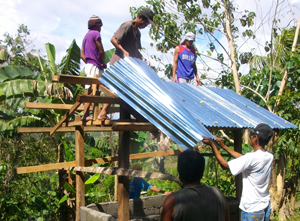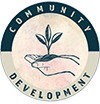ABM Archive Website
THIS WEBSITE CONTAINS ARCHIVE MATERIALS FOR HISTORICAL REFERENCE ONLY
For up-to-date information, including our latest appeals, news, and resources, please visit our current website.
Philippines:Economic Empowerment
 |
|
Free collective work construction of vermi-shelter in |
 |
This is part of the Community Development Program: Learn more about ABM’s Programs here
The Economic Empowerment project aims to build self-reliant and sustainable communities. Activities are aimed at increasing family incomes using resources already available to the communities.
One example is in the community of Sitio Mahayahay in the Philippines, which is home to 45 Bisayan settler families whose main livelihood is coffee production. Most of these families own farms that range in size between 1 and 5 hectares and yet in spite of this huge production of coffee beans, the community’s farmers have no facilities for handling the coffee berries, thus reducing the quality of the produce that they sell.
The challenges facing these farmers are compounded during the off-season. Many will produce corn and other cash crops to survive but it is often not enough for medical and school fees so many farmers feel compelled to turn to traders and loan sharks for financial assistance.
With interest rates of at least 10% per month it is hard to repay the loan. As such, these indebted farmers are often obliged, during harvest time, to sell their coffee products at a lower market price – one usually dictated by the trader who gave them financial assistance.
In 2014, the community of Mahayahay entered into a partnership with ABM’s partner, the Episcopal- CARE Foundation (E-CARE). The local people identified the potential to enhance their coffee production and income through the establishment of post-harvest facilities. The postharvest coffee facilities have enabled the community to ensure the quality of the coffee beans whilst at the same time adding value to the crops by selling them as depulped beans.
This means that more of the income from the sale of the coffee is returned to the farmer instead of being lost to outside agents. The project has also provided the opportunity and capital for 41 women to engage in a variety of alternative livelihood activities. These range from hog-raising to corn production, aquaculture to other microbusinesses.
In the community of Bagahabag, it was identified there would be benefit of owning a thresher, a machine for separating the stalk and the grain so hog-raising could be done in a more natural way. E-CARE offered training and support in natural farming systems so the project could expand to hog and duck raising enabling the sale of quality organic meat. Locals have noticed a significant improvement in the quality of the meat on their animals saying that their pigs are “meat-i-licious” rather than fatty. Another benefit has come from the fact that the pigs are much less odorous. This means fewer complaints from the neighbours which has enabled farmers to keep more animals on their site.
Your support of this project will give communities like Sitio Mahayahay and Bagahabag the opportunity to pursue new and more effective livelihoods.
PH001EE needs $40,000 in 2016 (tax-deductible)
| This project receives partial funding from the Australian Government. |
HOW TO DONATE
You can make an online donation to this project by selecting Philippines: Economic Empowerment
from the full project list.
Alternatively, for donations by cheque/money order (made out to the Anglican Board of Mission – Australia), telephone or email, view contact details here. Please don’t forget to include the project name and/or code with your payment details.
Gifts to ABM will be applied to the support of project(s) selected. In the unlikely event of the project being oversubscribed or not proceeding to completion, donations will be applied to a similar project to the one(s) selected.
PROJECT UPDATE
June 2016 – Fancy a healthy snack? If you were in Barangay Nayon in Lamut, Ifugao Province, we would highly recommend the Taro chips made by Dolores Bayucca and her colleagues. At 53 years old, Dolores is the chair of the women’s group at St John’s Mission in Nayon. These women have come together to both design and implement this taro chips activity. Read the story – ‘Success in Business’.
This video tells the story of the Kasalika Association in Manila, Philippines. Kasalika means ‘you belong’. It is the group that sews ABM bags for Synod packs in Australia.
The video was filmed and produced by Farida Pasiwen-Cawatig who is the Program Assistant on Research and Documentation for the Community Based Development Program of the Episcopal Church in the Philippines.
< Back


